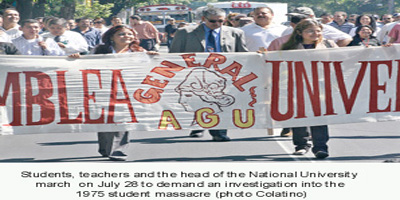The Gente are brutalized in El Salvador for speaking up
 |
|
by Anderson Franco/RPMJ intern at POOR Magazine They clutched their piece of brown cardboards that read "Bajen los Precios!" Lower the Prices! Accompanied by a flock of fellow high school and college students, they marched towards El Salvador's National University. Their weary eyes and nervous bodies paced through the fading San Salvador streets and apprehensively approached the university. Upon entering the campus they witnessed a scene that compared to that of a military barrack preparing for warfare. Stern black-suited men patrolled the exterior with threatening glances, another arsenal of policeman brandished their military weapons as they paced throughout the university, and snipers lay on rooftops, vigilantly watching the protestors like vultures anxious to ravage its victims. Soon after announcing their presence with signs and chants of protest, the law enforcement officers decorated the university with tear gas, rubber bullets, and authoritative shouts. The protesters scattered throughout the university, seeking shelter in any tree, shrub or building. They realized that their hope for social change had been silenced by the law enforcement officers. That was the scene on July 5, 2006. Although this incident occurred two years ago, excessive police force, particularly against social movements, continues to be a problem in El Salvador. Alexis Stoumbalis, the Bay Area coordinator for the Committee in Solidarity with the People of El Salvador's (CISPES) notes that "most of the complaints that the Office of Human Rights in El Salvador receives are complaints about the police." Many Salvadoran citizens have become victims of unnecessary policing tactics; police violence has escalated in the last two years. CISPES collaborated with Prisoners of Conscience Committee (P.O.C.C) to hold a film screening and panel discussion to critique the recent police violence in El Salvador. The event discussed the reappearance of death squads in El Salvador, and the United States financial support of the Salvadoran police through the Merida Initiative, and International Law Enforcement Academies (ILEA). The July 5th police brutality was not an isolated event. The protestors were terrorized and hushed by the black uniformed men one month after ILEA's inaugural class graduated. Stoumbalis believes that the officers involved in the catastrophe were recent alums from the United States funded military academy. Nevertheless, whether this is true or not remains a mystery because the academy refuses to release identifying information about its students or alum. Stoumbalis compares El Salvador's militaristic police officers to the "LAPD that raided LA Central gangs by roaming down the streets with machine guns" and Immigration and Customs Enforcement's (ICE) recent immigrant raids. These parallels not only indicate the violent police tactics, but the violation of human rights. P.O.C.C.'s JR Minister of Information and Chairman Fred Hampton Jr. have embarked on a CISPES fact finding delegation in El Salvador. They hope to understand the reappearance of the death squad activity, and to pressure the Salvadoran government to take action because the United States citizens are aware of the political assassinations and police brutality. "Bajen los precios!" I hope to hear these chants in the future. CISPES and P.O.C.C. hope to ensure that these voices will not be silenced, and future social movements will not be threatened by police officials. "Bajen los precios!" |



